
-
Find the right food for your petTake this quiz to see which food may be the best for your furry friend.Find the right food for your petTake this quiz to see which food may be the best for your furry friend.Featured productswith Chicken, with Beef
Hill's Science Plan Puppy Multipack Wet Dog Food with Chicken & Beef are complete premium pet foods for growing puppies from weaning until 1 year old and for pregnant and nursing dogs. Your puppy will love these deliciously smooth and savoury minced loaves, formulated for balanced nutrition and overall health.
Shop NowAdult Dog FoodHill's Science Plan Adult Multipack Wet Dog Food with Chicken, Beef & Turkey are complete premium pet foods for adult dogs from 1 year. Your dog will love these deliciously smooth and savoury minced loaves, formulated for balanced nutrition and overall health.
Shop Nowwith Chicken, with BeefHill's Science Plan Mature Adult Multipack Wet Dog Food with Chicken & Beef are complete premium pet foods for mature adult dogs from 7 years. Your dog will love these deliciously smooth and savoury minced loaves, formulated to deliver the appropriate amount of energy to support the needs of adult dogs.
Shop NowFeatured products with Ocean Fish, Chicken
with Ocean Fish, ChickenTender chicken chunks in gravy for cats, with L-carnitine and fewer calories for ideal weight management. Packed with high-quality protein, omega-6s, and vitamin E for shiny fur and healthy skin.
Shop Now Mature Adult Wet Cat Food with Chicken
Mature Adult Wet Cat Food with Chicken
Tender chicken chunks in gravy for mature adult cats. Made with easy-to-digest ingredients, high-quality protein for lean muscle maintenance and antioxidant vitamins C+E for optimal health.
Shop Now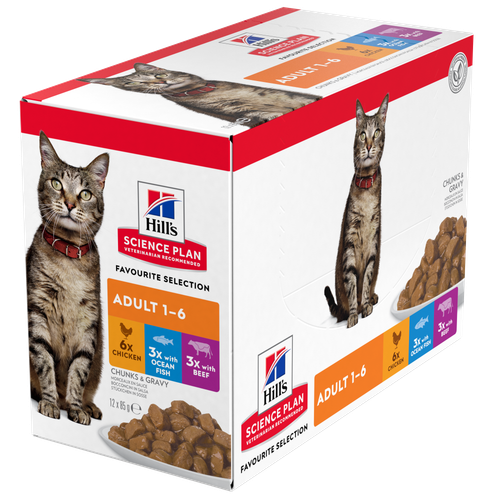 Adult Wet Cat Food with Chicken
Adult Wet Cat Food with ChickenTender chunks in gravy for cats, with high-quality protein to maintain lean muscle. With vitamin E and omega-3s & -6s for healthy skin and balanced minerals to support healthy vital organs.
Shop Now -
Dog
- Dog Tips & Articles
-
Health Category
- Weight
- Food & Environmental Sensitivities
- Urinary
- Digestive
- Joint
- Kidney
-
Life Stage
- Puppy Nutrition
- Adult Nutrition
- Senior Nutrition
Cat- Cat Tips & Articles
-
Health Category
- Weight
- Skin & Food Sensitivities
- Urinary
- Digestive
- Kidney
-
Life Stage
- Kitten Nutrition
- Adult Nutrition
Featured articles The Right Diet For Your Pet
The Right Diet For Your PetIn people, the right diet is very important. If you are eating the wrong way for your metabolism, activity level, age and lifestyle you could end up with health issues.
Read More The Incredible Science Behind Your Pet's Microbiome
The Incredible Science Behind Your Pet's MicrobiomeLearn what your pet's microbiome is, how it contributes to your pet's gut and overall health, and why nutrition is important in maintaining healthy microbiomes.
Read More Show some love with wet foods: a great choice for pets with health issues
Show some love with wet foods: a great choice for pets with health issuesShow some love with wet foods: a great choice for pets with health issues.
Read More -


The term “gastroenteritis” simply means an inflammation of the stomach and intestines. It’s usually pretty obvious if your cat is suffering from gastroenteritis because they may be sick or have watery, soft or bloody poo. Although diarrhoea may be difficult to spot if your cat goes outside to go to the toilet, vomiting is usually very noticeable because it takes them as much by surprise as it does you.
As you can imagine, especially if you’ve ever experienced this yourself, having gastroenteritis is pretty unpleasant for cats. Gastroenteritis can be acute (sudden and short-lived) or chronic, which means it goes on for more than two to three weeks. These longer cases are termed chronic enteropathies (CE), the most common form being Food Responsive Enteropathy (FRE). Chronic enteropathies are also sometimes called Inflammatory Bowel Disease (IBD).
In this article we’ll be looking at the common causes of acute gastroenteritis in cats. Acute gastroenteritis isn’t always a veterinary emergency and some cases may get better on their own, but there are times where action is needed. In this article we’ll look at the most common causes and what you can do to help your poorly companion.
Common causes of acute gastroenteritis
Dietary indiscretion. Dogs are the poster children for raiding the bin, but cats can fall victim of this too. Lots of cats sneakily steal food from worktops or may eat an unfortunate creature that doesn’t go down too well. These kinds of issues usually resolve pretty quickly on their own. This could also happen if you changed your cat’s food recently but didn’t transition the new food in over several days.
Viral infections can cause acute gastroenteritis in almost any animal, including cats. This is just one of the reasons to keep your cat’s vaccinations up to date.
Parasites, especially in large numbers, can be problematic for the intestines. Talk to your vet to make sure your parasite control is adequate for your cat’s lifestyle. For example, cats that hunt and eat their prey may need worming more frequently than a sedentary house cat.
Food allergies. These can be true allergies or intolerances.
Other medical issues. Gastroenteritis can be caused by other diseases such as kidney failure or an overactive thyroid gland (hyperthyroidism).


Tasty Tips
Should you worry about cat gastroenteritis?
There’s no one answer to this question. It all depends on the lifestage of your cat, what other problems they have, if any, and how severe the gastroenteritis is. As we said, many cases resolve on their own, so if your cat is sick a few times and is a little miserable for a day, you can probably afford to wait 24-48 hours and see if it settles. If any gastrointestinal upset goes on for more than 48 hours, though, you should see your vet.
One of the biggest worries is dehydration from vomiting particularly, but also diarrhoea. If your cat is vomiting very frequently, seems to be in pain, or is depressed and inactive, seek veterinary attention straight away. A simple test you can do for dehydration is the ‘skin tent’ test. When an animal is well-hydrated, if you gently pull the skin on the back of the neck up and let go of it, it will ping smoothly back into place. If your cat is a little dehydrated, it will be slower to return to position. In severe dehydration, it stays poking up like a tent, hence the name of the test.
If your cat gets better on their own but you notice that they have regular bouts of upsets, you should also see your vet as there may well be an underlying cause.
If your cat needs veterinary attention, it’s really useful if you can take a stool sample (your cat’s!) with you. Your vet can test for parasites, infection and the presence of things like blood. Depending on the initial clinical exam, your vet may want to:
Give a highly digestible, high-quality, digestive support food to your cat for a few days to help the gut heal.
Treat for any parasitic or bacterial disease that is found.
Do blood tests to rule out other diseases.
In cases of dehydration your cat may need to stay in the hospital to have intravenous fluids and supportive care.
In some cases, if the signs of gastroenteritis become chronic or recurrent, x-rays, imaging and even biopsies may be necessary.
Fundamentally, you know your cat better than anyone. If ever you are concerned, please don’t hesitate to ring your vet. We would always rather be safe than sorry and, as with all things health-related, the sooner you get help the better.
Reviewed by Dr. Hein Meyer, DVM, PhD, Dipl-ECVIM-CA


One of our staff authors prepared this article for you
Related products

Hill's Science Plan Adult Sterilised Cat Dry Food with Salmon is specially formulated with ActivBiome+ Multi-Benefit Technology. It is a precisely balanced nutrition, tailored to meet the needs of sterilised cats, to help keep them lean & healthy.

Hill's Science Plan Hairball & Perfect Coat Adult Cat Food with Chicken is formulated to effectively help avoid hairball formation in adult cats while promoting a beautiful coat. Thanks to its mix of essential omega-6 fatty acids, this food benefits the cat's skin and fur, keeping them healthy and shiny. Our Advanced Fibre Technology helps reduce hairballs by naturally promoting their passage through the gut. This food is formulated with high-quality protein for a perfectly balanced, great-tasting recipe.
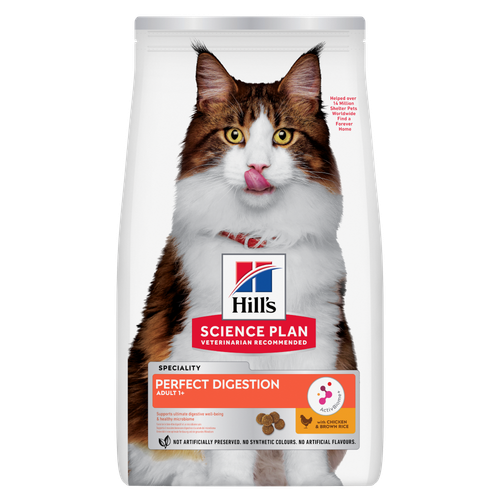
Hill's Science Plan Perfect Digestion Cat Food with Chicken & Brown Rice nourishes your cat's unique microbiome and helps them reach their full potential.
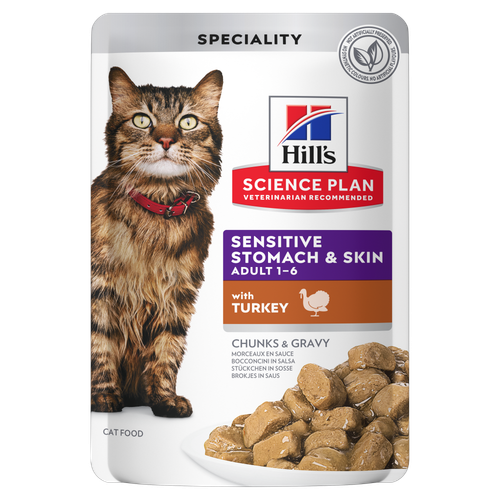
Hill's Science Plan Adult Sensitive Stomach & Skin Cat Premium Chunks in Sauce with Turkey is a complete pet food for adult cats aged 1-6 years
Related articles
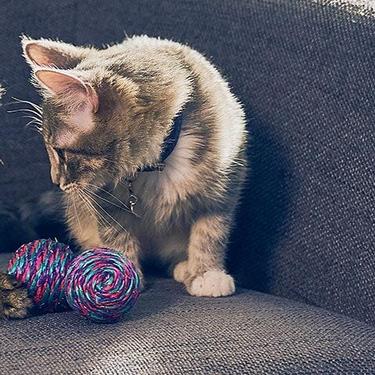
Kittens grow a lot in their first year, so it is important to provide them with the proper nutrients early, so they grow up healthy and strong. Learn more.
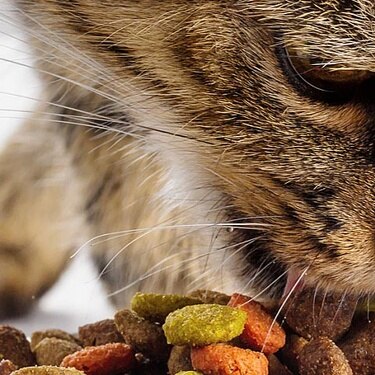
From essential vitamins & minerals to different types of meat, learn what to look for when choosing the best cat food for your feline.

There are three common ways to feed a cat. Each way has its advantages and disadvantages.
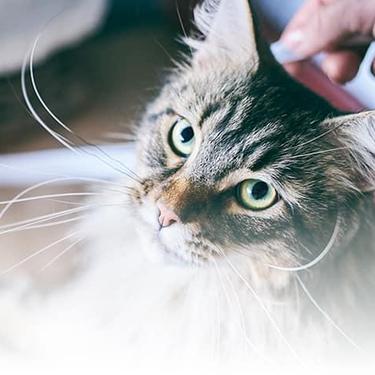
Learn how to make homemade cat treats that are healthy for your pet with this recipe from Hills Pet Nutrition.

Put your cat on a diet without them knowing
Our low calorie formula helps you control your cat's weight. It's packed with high-quality protein for building lean muscles, and made with purposeful ingredients for a flavourful, nutritious meal. Clinically proven antioxidants, Vitamin C+E, help promote a healthy immune system.
Put your cat on a diet without them knowing
Our low calorie formula helps you control your cat's weight. It's packed with high-quality protein for building lean muscles, and made with purposeful ingredients for a flavourful, nutritious meal. Clinically proven antioxidants, Vitamin C+E, help promote a healthy immune system.

